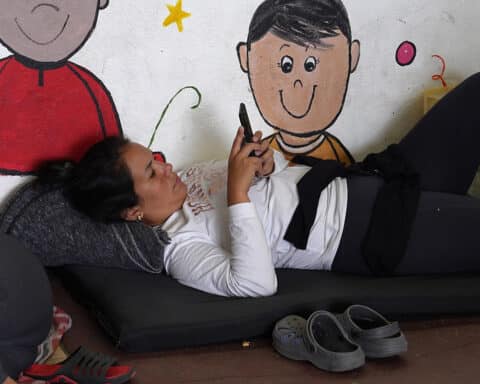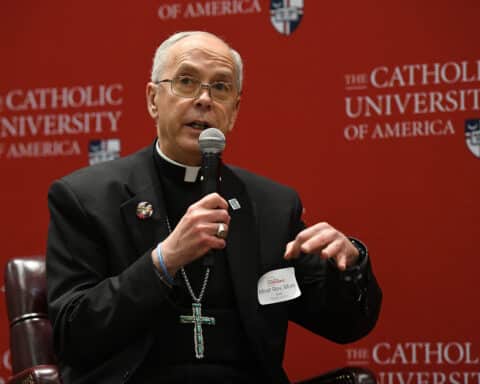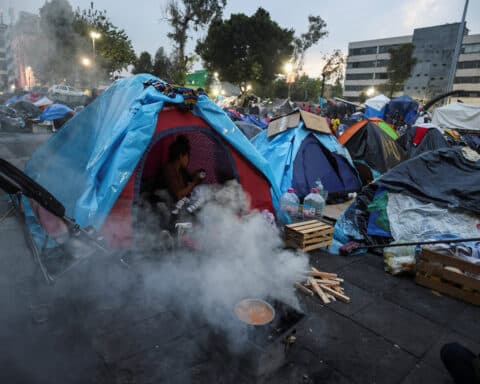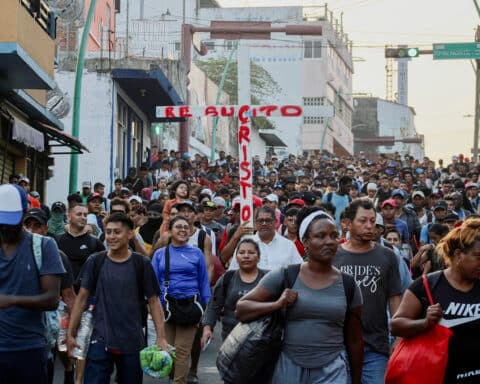Weeks after President Trump signed an executive order rescinding the “zero-tolerance policy” for separating families at the border, many still remain to be reunited. As Americans have watched to see how the U.S. government responds to this crisis, Church leaders have been vocal and have taken action to assist immigrant families, both at the border and in communities across the country.
In a joint press release on July 12, the U.S. Conference of Catholic Bishops and Catholic Charities USA addressed efforts to reunite families at the border:
“As we have long done, CCUSA and Migration and Refugee Services of USCCB are lending our experience and expertise to support Catholic Charities agencies in their efforts to reunite families and care for immigrant children during this sensitive time. While we strongly oppose the policies that led to these families being separated, we remain committed to working to ensure their safe reunification. Protection of families is a foundational element of Catholic Social Teaching and this moment calls on all people of good will to lend a hand to reunite these children with their parents,” the statement read.
The same day, Catholic Charities USA announced that their president and CEO, Dominican Sister Donna Markham, met with migrants recently reunited with their children during a two-day visit to the southern Arizona border.
Her trip included a visit to the Kino Border Initiative, followed by a walk across the border to Mexico, where she spoke with parents and children who have waited for days to present their asylum cases to U.S. border officials.
On the local level, others such as Bishop Daniel E. Flores of the Diocese of Brownsville, Texas, and Sister Norma Pimentel, executive director of Catholic Charities of the Rio Grande Valley, have raised their voices and hands to support efforts to reunite families and care for those detained at the border.
“As a bishop, my first role is to help facilitate those who know what they’re doing, especially Catholic Charities, to do it as efficiently and as humanely as possible because that’s [what] the work of the Church is, to respect the dignity of the people who are coming to us and to give them a smile and welcome that perhaps they haven’t seen anywhere since they left their native country,” Bishop Flores said in an interview with Vatican News. “What gets lost in the whole discussion at the national level is basically the face of the persons affected, and that’s what the Church, I think, has to continually keep us focused on.”
Beyond the border
Throughout the country, local and national Catholic organizations have found ways to help those affected at the border and in their own communities.
One such organization is the Catholic Legal Immigration Network, Inc., known as CLINIC, a network of Catholic and community organizations that provides legal help in the area of immigration to low-income families and individuals.
Earlier this summer, Jennifer Verkamp, a social worker and director of Catholic Immigration Services of Arkansas, which is operated by Catholic Charities in the Diocese of Little Rock, joined three attorneys from CLINIC affiliates and CLINIC staff on a trip across the border at Nogales, Arizona.
They found about 100 people in line, waiting on the sidewalk to get into the building where they could make their cases for asylum, as a new Trump administration policy denies access to those seeking asylum due to gang or domestic violence.
Those at the front of the line had said they had been there for seven days, Verkamp said; those at the end of the line had been there for two days. Most were from Central America, and most were women with children, the youngest of whom was six months old.
“I brought coloring books and little toys,” Verkamp said. “They were gone within a few minutes. I was surprised at how many children there were.”
Verkamp said the attorneys would speak with clusters of would-be immigrants, advising them of what might happen to their children. “They were shocked,” she said.
Several women spoke to her one-on-one. One young woman, perhaps in her late teens or early 20s, told Verkamp that she was from Guatemala and seeking asylum in the United States after a man pressured her for sex. When she refused, the man said he would kill her 2-year-old child.
“She didn’t even know how he knew she had a child,” Verkamp said.
After having a friend killed by gang members, the woman believed the threat was real — real enough to traverse Mexico with a toddler and wait in 100-degree temperatures, her child sleeping on the sidewalk, for the chance to find safety.
Verkamp praised the efforts of groups that work at the border, such as the Kino Border Initiative. Volunteers were coming and taking people from the line for short periods of time so they could shower and bring food to their families. She also saw U.S. citizens, dismayed by what they saw when they were returning to the United States, go buy food to distribute among those waiting for an interview.
When Verkamp and her companions crossed back into Arizona after several hours, the CBP agent who processed them asked what they had been doing in Mexico. When they said they were attorneys and social workers talking to asylum seekers, the agent said, “‘You weren’t giving them advice, were you? We have to sit here and listen to their stories, and you can’t believe them.'”
“I wanted to say something to him,” Verkamp said. “But at the moment, I didn’t think there would be any point.”
Challenges in the States
Organizations like CLINIC are great examples of Catholic outreach to the vulnerable, but the border is not the only place help is needed. While families who have already crossed the border faced difficulties to get here, they will encounter other challenges in the days, months and years afterward.
Back in Arkansas, Verkamp has seen wide fluctuations in the number of clients seeking legal assistance for immigration. Some are too afraid to even seek help now, she said.
With the changes to the asylum law and the end of temporary protected status for several countries — under which many immigrants legally lived and worked in the United States for decades — it is harder to find grounds for those without documents to apply for legal status. “We’re thinking of maybe doing a citizenship push for the ones that are eligible,” Verkamp said.
Jeanne Atkinson, executive director of CLINIC, said the organization is trying to keep its members and affiliates up to date on what the immigration changes are and what they mean, which can be a challenge as things are changing so quickly that sometimes the government distributes inaccurate information.
“We are now in an environment where our affiliates are being called to a much higher level, much more complex immigration law,” she said. “The consequences have always been high. The consequences feel very high today.”
Diocesan ministry
The Archdiocese of Chicago has a unique way to offer support and assistance to such families. Its Pastoral Migratoria, an immigrant-to-immigrant peer ministry, will celebrate its 10th anniversary in August.
The ministry is fully active in more than 50 parishes and provides resources for more than 60 others. While most parishes that operate the ministry serve primarily Spanish-speaking immigrants, a few parishes also offer the ministry in Polish, said Raymundo Valdez, Pastoral Migratoria’s national outreach coordinator.
Peer ministers go through a formation and training process. Then they bring services and assistance to their parishes, such as visits from representatives of the Mexican Consulate or immigration lawyers from various legal aid organizations. They also walk with families in challenging circumstances, such as having a parent deported, or, as happened at one parish recently, having a parent return to Mexico for months to complete paperwork to get legal status.
“Some of the leaders provide citizenship classes, help people fill out immigration applications, go personally to the interview,” Valdez said. “In the case of St. Rita Parish here, after they pass the exam and they become citizens, they are invited during the Masses to receive a special blessing.”
They also work on advocacy, asking parishioners to call or write legislators, visit congressional offices and organize marches. With funding from the Vincentians community, the Archdiocese of Chicago is trying to expand the program to other areas. “We’ve noticed that other dioceses are eager to provide support to the local immigrant communities, but sometimes they haven’t developed the tools,” Valdez said.
Earlier this year, the Pastoral Migratoria started pilot programs in the Archdiocese of Kansas City-St. Joseph, Missouri, and the Diocese of Stockton, California. The Archdiocese of Kansas City invited Pastoral Migratoria after there were rumors in the immigrant community that undocumented people would be rounded up at church. “Nothing happened,” Valdez said. “It was just a rumor. But there was the fear, that going to church or taking your children to religious ed classes would mean you would never see your family again.”
To make the program available to more dioceses sooner, the archdiocese hosted its first Instituto Pastoral Migratoria on July 11-15. The four-day training and formation session welcomed 30 representatives of 11 dioceses, from New York, and Los Angeles to Des Moines, Iowa, and Little Rock, Arkansas.
Cardinal Blase J. Cupich of the Archdiocese of Chicago reminded participants that in such initiatives immigrants are not to be seen as strangers or outsiders, but “as contributing and using their spirituality, their heritage to enrich the life of our Church and our country.”





